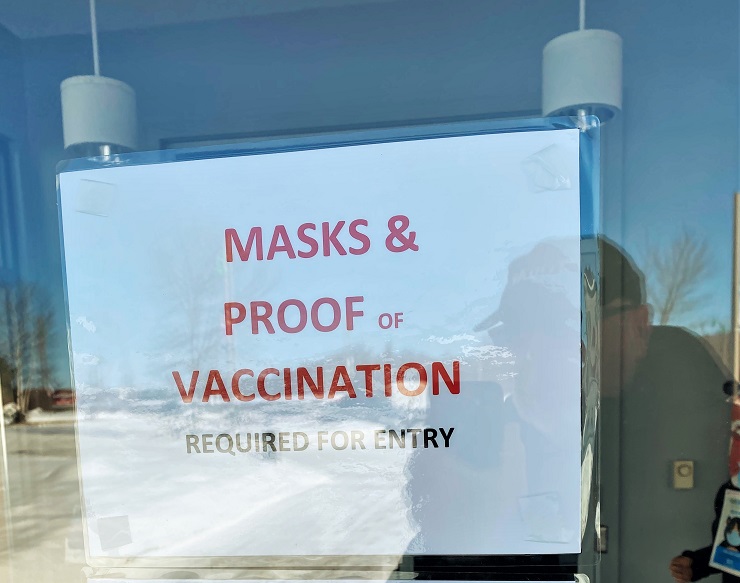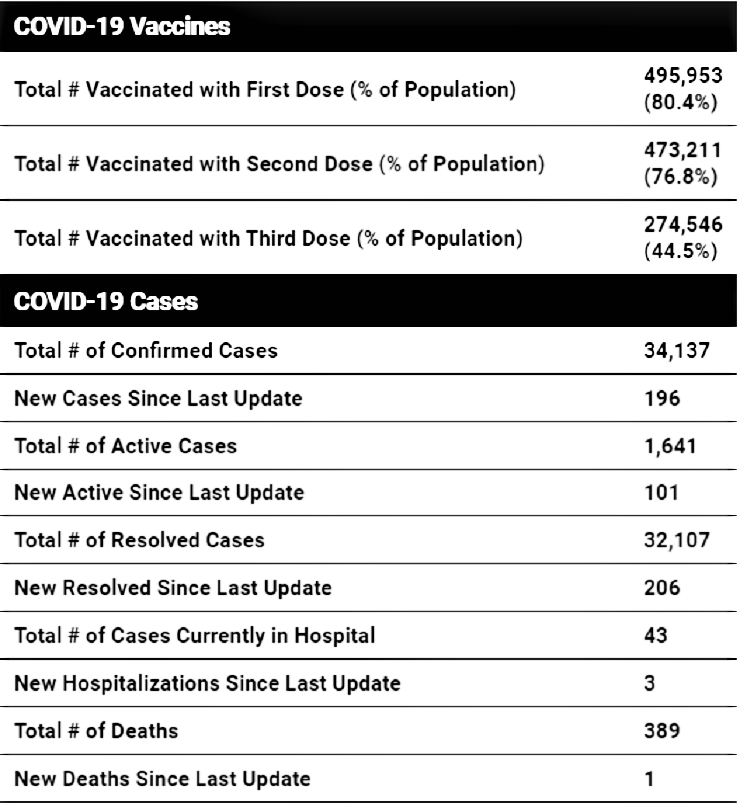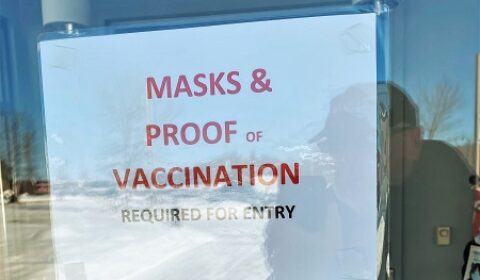9 MUSKOKANS IN HOSPITAL TODAY WITH COVID, AS RETRICTIONS EASED THURSDAY
Mark Clairmont | MuskokaTODAY.com
SIMCOE-MUSKOKA — With 9 Muskokans in hospital today with COVID a “high risk” remains of more people being infected, says Dr. Charles Gardner.
And as the province lifts more restrictions, including at restaurants tomorrow, he says “transmission can happen in those settings.
“And people need to be aware of that and decide for themselves what risk they want to take.”
See below for Gardner’s response to trust in public health, opposition to health measures, planning and the “unknowns of an election.”
Simcoe-Muskoka’s medical officer of health said in his view the province is “opening a little early … thus there is an increased risk.”
He said 16 of the 43 people (37 per cent) in hospital as of Wednesday were unvaccinated, including 6 of 12 in ICU. Fifteen (38 per cent) had two vaccines and make up 5 of those in ICU. Four are partially vaccinated with one dose and 8 had their booster shot.
Hospitalizations are at the highest rate ever at 4.2 per cent per 100,000 population per week. And the same ICU rate is 0.8 per cent per 100,000.
As well with an average of 11 deaths per week that’s also a pandemic high.
Of the 11 deaths this past week (1 in Muskoka) 8 were men and 3 women ranging in age from their 50s to 90s. Four were associated with institutional outbreaks. Six had two or more doses of vaccine and 5 were unvaccinated.
Positivity rates also remain “very high” in the region at 10.2 per cent, compared to 12.6 per cent last week and the provincial rate now of 14.7 per cent.
This as Simcoe Muskoka District Health Unit (SMDHU) reports 196 cases today, the same number as Public Health Ontario posted on its website. So far this week there have been 312 cases.
And 1 death, a man 65-79, in the community in Simcoe, Feb. 8.
And while the region is on a downward trend along with Ontario it is still a bit higher.
Gardner says confirmed cases are up 1,097 since his last update Feb. 9, raising the running total to 34,137.
It also means the number of cases in the fifth wave surpasses all of he previous waves combined.

Outbreaks are down this week to 32 from 40 last week. However, Gardner noted only congregate and health care setting OBs are being tracked due to numbers overwhelming staff. So workplaces are not being counted.
Eighteen institutional outbreaks remain (down from 22 a week ago) and two at hospital units and a correctional facility, 9 LTCs (unchanged) and 7 retirement homes (down from 9) and 10 child care settings (down from 12).
Gardner cited progress in vaccinations with over 88 per cent for those 12 and older; 85 per cent have had two doses and 55 per cent 18+ have had booster shots (71 per cent for those 50+ and 83 per cent of those 70+).
The health unit has bookings for 700 booster shots with capacity for more.
With regard to child vaccinations 48 per cent of kids 5-11 have had their first dose.
Three school clinics saw success during the afternoon and early evening for the public. That included 2,600 parents in Simcoe who signed parental consent forms. Gardner had no numbers for Muskoka’s Trillium Lakelands District School Board or Catholic boards.
So the health unit will continue those next week at other schools.
As of Friday, all children 12-17 will be eligible for booster shots 168 days after their second shot.
Wastewater monitoring continues in Orillia, Barrie, Midland/Penetanguishene and Collingwood with persistently high counts compared to previous waves.
That is consistent with higher risk even as they have come down and have now plateaued.
See the Ontario COVID Science Advisory Table website for further sub-region breakdowns.
Gardner on public trust, opposition, planning, election …
In response to a media question about less case information now being available and whether that undermines the public’s confidence in public health, Gardner said with more transmission of Omicron staff have been unable to keep up with contact tracing and providing accurate data reflecting the region as a whole.
He said difficulty in keeping up was expected. He called it “impossible.”
But he said while there will always be people who won’t find them trustworthy, overall he believes public trust will remain.
He said: “It’s always very important that people trust us to provide honest and clear messaging and advice. And we, I strive to do that. My colleagues strive to do that. To be transparent. To indicate the degree to which we know things or can know things. Or when we can not be certain of things. … It’s very important that we be transparent and be trustworthy. And give the very best advice that we can.”
Gardner added “… and now we have quite a substantial opposition to public health measures. There’s been some of that earlier in the pandemic as well, although I agree right now it’s very high.
“I think in the end people have to decide for themselves who they will trust. And all we can do in public health is do our very, very best to be trustworthy and to provide good information to the best of our ability — is what we strive to do.
“And I believe that most people still turn to us as a trusted, reliable source of information and guidance. Even if there are many who do not.”
Gardner continued saying it’s too early to talk about this being an “endemic.”
He added that emergency provincial orders have no effect on the health unit, which he said already have “significant” powers under the health protections and promotions act.
Planning for kids under 5, future vaccine rounds
And as for hindsight being 2020, Gardner was asked about planning ahead six months, a year, two years out to avoid another pandemic or an endemic.
He said his past two years’ experience has shown him the need to return to other avenues of service the health unit provides, which have had to take a back seat from a resources standpoint.
“And as I see case counts coming down we are now, again, looking at how we get back to doing those programs. … So we do have a priority approach in mind.”
He said all of public health has.
“I’ve been involved in a discussion paper from the association of local public health agencies on public health resilience and recovery that identifies the areas of priority to commence,” such as the Opioid crisis or mental health.
And getting back in place some of our inspection programs such as food safety.
“If things continue to slow down and the demands of COVID-19.”
Gardner admits the virus may not slow down right away, there may be resurgence and “we will see some kind of emergence of new variants we will have to respond to.”
He said there is also the potential to be vaccinating children under 5 to be prepared for.
“And there’s the possibility of future vaccination campaigns for with new vaccines COVID-19, potentially in the fall or at a later point. We’re looking at that and how we would get our other programs running.”
He said he has taken that to the health unit board for funding and gotten approval for additional funding from the province for that kind of recovery work and the ongoing response to the pandemic.
“So that really carries us through to the end of this year.”
Election and changes to health care
He added “there’s a lot of unknown that would come with the election as well. And what provincial government priority may be following the election for public health and the broader health care system. All of that is unknown to us. We do know that we’re almost certain to be participating in reviews of the response to the pandemic and reviews of the public health system. And how it should be changed as well.
“So that would carry us well in to 2023.”
Gardner reiterating his confidence in booster shots, despite Premier Doug Ford questioning their efficacy yesterday.
Finally, he said regarding the March 1 lifting of vaccine passports by the province that he and other MOHs would certainly support restaurants and other businesses continuing to require vaccine proof. Even a three-dose requirement.
Huntsville hospital outbreak declared over
Muskoka Algonquin Healthcare (MAHC), in consultation with the Simcoe Muskoka District Health Unit, has declared the COVID-19 outbreak on South Wing at Huntsville District Memorial Hospital (HDMH) site over, they say in a release later Wednesday afternoon.
The outbreak lasted a total of 10 days with only the initial one patient case and one staff case attributed to the outbreak.
The unit has reopened to admissions as well as visitors according to MAHC’s visitation policy, currently at Phase 1 to allow the patient’s designated care partner to visit once a day between visiting hours of 10 a.m. to 4 p.m.
In addition, enhanced surveillance for COVID-19 on East Wing at the HDMH Site has been lifted. Last week, enhanced surveillance for COVID-19 on East Wing at the South Muskoka Memorial Hospital Site was lifted.
“Through attention to outbreak management protocols, good hand hygiene and effective use of personal protective equipment, our staff at both sites are commended for limiting any additional COVID-19 transmission,” says Vickie Kaminski, interim president and CEO.
HEALTH UNIT HIGHLIGHTS:
- 34,137 confirmed cases to date
- 312 new cases this week
- 762 new cases reported to the health unit last week (week of February 6), 20% lower than the 949 cases reported for the week of January 30.
- 27 deaths in February, 71 in January
- From July 18th to February 15th, the rate of COVID-19 hospitalizations among the unvaccinated vaccine-eligible Simcoe Muskoka population is 4 times higher than it is for those who have received at least two vaccine doses, the rate of COVID-19 ICU admissions is nine times higher and the rate of deaths is 3 times higher.
- 1,263,176 doses of COVID-19 vaccine have been administered
- 495,953 resident have received at least one vaccine, which represents 80% of the total population
- 85% of the population 5+ have had at least one dose of vaccine including 81% of youth 12 to 17
- 48% of children 5 to 11 years of age have received at least one dose of vaccine

IN OTHER COVID NEWS …
- It’s a toss up between which invasion will happened first: Russia on Ukraine or Ottawa police on protesters. The Parliament Hill standoff that has protesters calling the Emergencies Act a “scare tactic” will soon find out. Authorities have told them to go peacefully or be removed forcibly.
- Ottawa’s Children’s Aid Society has told parents with kids to pack them up if the adults face police measures or else the CASO can take their children to protect them.
- Inflation topped 5 per cent for the first time in 30 years. In January it was 5.1 per cent, after 4.8 per cent in December.
- Newfoundland and Labrador are ending all mask restrictions and vaccine requirements March 14.
- Some Ontario doctors want the province to allow outpatient centres to deal with surgery backlogs.
- PEI Premier Dennis King is self-isolating after a family member had contact with an infected person.
- Pfizer’s partner BioTech is to open a vaccine manufacturing plant in Africa.
EMAIL: news@muskokatoday.com
28 years of ‘Local Online Journalism’
Twitter: @muskokatoday, Facebook: mclairmont1
Leave comments at end of story
SUBSCRIBE for $25 by e-transferring to news@muskokatoday.com
Or go online to https://muskokatoday.com/subscriptions
